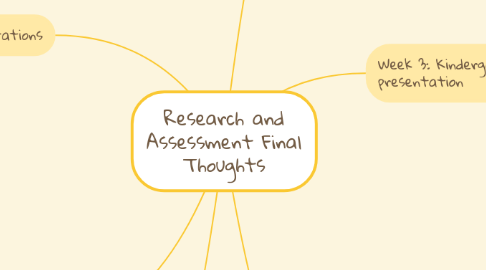
1. Big Take Aways From the Course
1.1. Work with your students in assessment, use peer and self assessment and make them an active part of their own learning
1.2. give feedforward and be specific with how your students can improve
1.3. be consistent, keep observing and collecting data throughout the year but do not just make an avergae of what is collected
1.4. Checklists, single point rubrics, anecdotal notes, peer and self assessments: are all useful tools, do not just use one
1.5. assessment is to help our students grow, grades do not mean everything and we need to coach our students to see the importance of improving themselves
2. Week 4: Presentations
2.1. Single point rubrics: they are the way of the future and even though they may take the teacher longer to fill out they are all about feedback and sometimes it's hard to fit that into a mold
2.2. The ETFO website has so much info we can use on all topics, there are even templates for rubrics, peer assessments, self assessments, etc
2.3. junior and primary assessment strategies are pretty similiar: one difference I found for my topic junior self/peer assessment vs primary, was that junior you can give them the option to reflect more on strategies and even write comments
3. Week 2:
3.1. Looked at EQAO questions and determined what kind of questions they were Knowledge, application thinking or communication
3.1.1. with thinking you use tools to solve but there more be more than 1 way to solve, it's problem solving and it is more difficult to assess
3.1.2. application has students select a tool and then use that tool to fit the problem: ie using an equation to find the perimeter of a circle
3.1.3. knowledge is memory essentially, it's what you know about a subject and understand meaning
3.2. sorted report card comments into level 1, 2, 3, 4
3.2.1. learned that it's all about that wording, some, limited, consistently, all the time, etc, they all are used to explain where each student fits on the grading scale
4. Week 6:
4.1. what is the best movie of all time?
4.1.1. whole aud gave a variety of answers, always someone in the audience who agreed with their choice
4.1.2. Dawn's old students said Hot Tub Time Machine 2: why? No criteria for what is a good movie
4.2. we need to collect data over time
4.2.1. data could be observations and conversations
4.2.2. could be recording absences and lates
4.2.3. we use this data to analyze, we can make a plan on our class using that data especially if our class is giving us a hard time
4.3. looked at EQAO answers and gave feedback to them
5. Week 1: Intro
5.1. The student knows more than the teacher about what and how he has learned - even if she knows less about what was taught. - Peter Elbow
5.1.1. This was my favourite quote out of the ones on the slide because it reminds us that it is ultimately the student who knows exactly what they've learned but sometimes as teacher's we are quick to judge and say things like this kid has no clue how to do math... meanwhile the kid may know more than we think we just have to find the right way for them to demonstrate it to us
5.2. DON'T
5.2.1. Give marks for hmwk and practice
5.2.2. use zeros
5.2.2.1. this was hard for me to grasp as I just came from a highschool placement where there was a girl who failed 9th grade because of this. She didn't come to class and would write nothing on her tests
5.2.3. accumulate evidence over time and use all of it to create a grade
5.2.3.1. you shouldn't average out because usually kids do better at the end of the year after they've learned
5.2.4. do grade pollution!! by giving bonus marks or extra credit.. it skews results
5.2.4.1. conferencing and conversations with the kids
6. Week 3: Kindergarten presentation
6.1. Kindergarten does not follow a traditional grading system
6.1.1. mostly anecdotal notes
6.2. Kingergarten is looking at interactions and behaviours
6.3. When I taught kindergarten in Korea there was a similar grading system. It was looking at behaviours and being able to do simple tasks like count and identify letters. The school I was at claimed to follow a Canadian system.
6.3.1. This also reminded me that I do not want to go back to teaching kindergarten as the burn out was fast and even though I loved my students, I need to be able to have a different kind of interaction with the older grades.
7. Week 5
7.1. Dawn reiterated the single point rubric that a few groups had talked about in their presentations
7.1.1. single point rubrics are so much better in giving feedforward
7.1.2. rubrics in general should have level 4 to the left because we read from left to right so it should be that the student looks at what is best first
7.1.3. "students will rarely read feedback if grade is attached"
7.2. kids are always worried about what grade they are going to get... I noticed this a lot in my last placement, they were all really determined to hit all the things they needed to get an A, however we were in an art class and drama class so getting an A didn't always mean knocking off all the points on the rubric, our students had to let go of that and we coached them a lot to not stress about whether or not it was an A but rather how much they had improved since the beginning of the year
7.3. Feedforward
7.3.1. give feedback that helps them improve and grow, not just compliments but specific advice on how the student can improve their work
7.3.2. user friendly so that parents and students can understand

